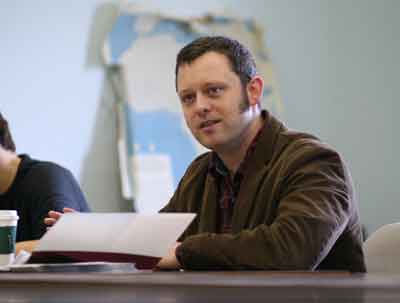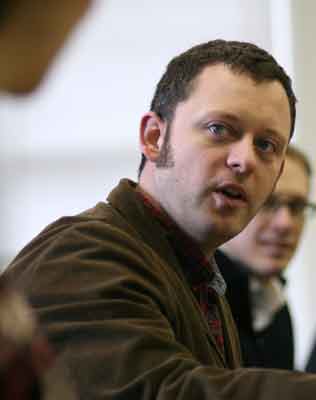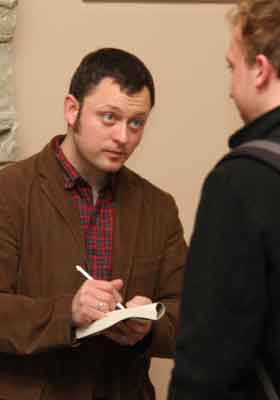 It’s hard to imagine a better pairing than Benjamin Percy’s deep baritone voice and his story “Heart of a Bear.”
It’s hard to imagine a better pairing than Benjamin Percy’s deep baritone voice and his story “Heart of a Bear.”
Or a more intriguing first line: “The bear did not know he was capable of love. That would come later.”
Or, for that matter, a more memorable reading.
(Listen to Percy read “Heart of a Bear” here.)
“I know when I read a Percy story that the language will startle, the imagery will transport me,” said Wabash Assistant Professor Eric Freeze, introducing the award-winning author of the short story collections Refresh, Refresh and The Language of Elk and frequent contributor to Esquire magazine. Percy’s novel The Wilding will be published by Graywolf Press in the fall, and his short story "Refresh, Refresh," in addition to being re-published as a graphic novel, is being produced as a film.
“There’s something haunting in these stories that stays with me,” Freeze said.
What will stay with the Wabash students Percy has worked and spoken with here during his two-day visit are his generosity and a demystified path to becoming a writer—an approach that values "single-mindedness," hard work, and attention to craft and the work of others.
“Often writers talk only about themselves,” Seth Einterz ’11 said after Tuesday night’s reading and question and answer session. “But he also talked about other writers, what he learned from them, and I appreciated that.”
Percy singled out Tim O’Brien, Flannery O’Connor, and Wabash College alumnus Dan Simmons ’70 among many whose writing inspired him.
“He’s been excellent with our students,” said Freeze, who had worked with Percy last summer at Indiana’s Ropewalk Writer’s Retreat at New Harmony and instantly knew he would be a great fit for Wabash students.
 Meeting with student writers earlier in the day, Percy emphasized the need for self-discipline and routine.
Meeting with student writers earlier in the day, Percy emphasized the need for self-discipline and routine.
“Writing is revision, and one of the keys to revision is a regular, regimented schedule—time set aside every day, time to get yourself into the zone,” Percy said. He quoted author Harry Crews—words Percy keeps by his desk: "You have to go to considerable trouble to live differently from the way the world wants you to live. That’s what I’ve discovered about writing. The world doesn’t want you to do a damn thing. If you wait till you got time to write a novel or time to write a story or time to read the hundred thousands of books you should have already read--if you wait for the time, you’ll never do it. 'Cause there ain’t no time; world don’t want you to do that. World wants you to go to the zoo and eat cotton candy, preferably seven days a week."
“If you write regularly, you always know there’s more timber coming, and you’re not afraid to throw away what isn’t working, those 'darling,' as Faulkner called them,” Percy said. “I’ve thrown away thousands of pages.” He offered the examples of writing ten revisions of a piece for Esquire, as well as two failed novels before The Wilding was accepted for publication. “Writing those other novels was not wasted time, because I learned to write this one by writing those."
Percy urged the young writers to turn off their cellphones, email, the internet and other electronic distractions.
“If you can’t discipline yourself to unplug, you’re not going to write.”
Percy came to writing relatively late in his undergraduate career. Majoring in archaeology, he spent summers working as an intern in the Oregon of his youth. Eventually finding it unsatisfying, he was the summer gardener at the Many Glacier Hotel at Glacier National Park when he met and began writing pieces for his girlfriend (now wife), Lisa.
 “She said, ‘You should be a writer,'” Percy recalls. He took her advice and changed paths, eventually earning his MFA in Creative Writing at Southern Illinois University.
“She said, ‘You should be a writer,'” Percy recalls. He took her advice and changed paths, eventually earning his MFA in Creative Writing at Southern Illinois University.
“I had a lot of catching up to do,” Percy says of his first classes at SIU. “The majority of the people in that class were much more talented.”
Percy countered with self-discipline and careful attention to the writing of authors like O’Brien and O'Connor, mapping out the ways the stories were constructed (using a grid system like that he had learned in archaeology) to better understand their structure. His first collection of stories, The Language of Elk, was published in 2006, and “Refresh, Refresh” won the Pushcart Prize that same year and was included in the anthology Best American Short Stories 2006. In 2007 he was awarded the Plimpton Prize by the Paris Review, and in 2008 he was among the winners of the Whiting Writer’s Prize, which awards $50,000 to poets, fiction and nonfiction writers, and playwrights "of exceptional talent and promise in early career.”
Percy chose to conclude his visit to Wabash by attending the Beta fraternity dinner for faculty on Wednesday night.
Photos by Drew Casey ’12 and Steve Charles